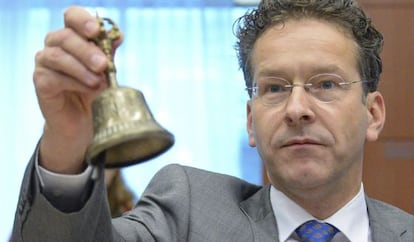Spanish Economy Minister De Guindos loses race to head Eurogroup
Jeroen Dijsselbloem, who led negotiations with Greece, gets re-elected to second term

Spanish diplomacy was dealt an unmitigated blow on Monday with the re-election of Jeroen Dijsselbloem to preside the Eurogroup, the name given to meetings of euro-zone finance ministers.
The Dutch finance minister had been challenged by Spanish Economy Minister Luis de Guindos, but was the odds-on favorite to win the race after Europe reached a deal with Greece over a third bailout on Monday. Dijsselbloem was known for his hard line against Greece over its debt crisis.
Spain is a great country and will have other opportunities”
Jeroen Dijsselbloem, Eurogroup president
This is the second major slap in the face in Europe for the Popular Party (PP) administration of Mariano Rajoy after it failed to secure a seat on the board of the European Central Bank (ECB) in 2012. This position was pivotal, given the ECB’s key role in the way the economic crisis has been handled in Europe.
Spain is the fourth largest economy in the euro zone, and the fifth most populous state in the EU. It has two of the world’s largest banks, top-tier executives and major multinationals in sectors ranging from telecommunications to energy and infrastructure.
But the country is boxing below its weight class: Spanish diplomatic representation in key international positions began declining during the last period of José Luis Rodríguez Zapatero’s Socialist government, and the trend has intensified under Rajoy, who got personally involved in De Guindos’ run for the Eurogroup presidency.

After securing a rotating seat on the United Nations Security Council, the Spanish prime minister had been campaigning for De Guindos for months, and managed to gain Germany’s support.
Asked about the ballot, two sources confirmed that De Guindos had lost to Dijsselbloem by 12 votes to seven, although another source at La Moncloa, the seat of Spanish government, said it was closer.
It did not help that De Guindos announced a few weeks ago that he would not be seeking a second term as economy minister back home. The position of Eurogroup chairman has only been held by sitting ministers to date. Spain is also scheduled to hold general elections in the fall, when the PP could lose its hold on power.
Sources said that while De Guindos is respected in Europe for his management of the Spanish banking bailout and for navigating the end of the economic crisis, it was difficult to replace Dijsselbloem in the middle of the Greek standoff.
After the results were released, De Guindos congratulated Dijsselbloem for winning another two-and-a-half-year term, but noted that “Spain deserves greater representation.”
“Spain is a great country and will have other opportunities,” said Dijsselbloem. The next big opportunity will come in 2018, when candidates vie for the ECB vice-presidency.
English version by Susana Urra.
Tu suscripción se está usando en otro dispositivo
¿Quieres añadir otro usuario a tu suscripción?
Si continúas leyendo en este dispositivo, no se podrá leer en el otro.
FlechaTu suscripción se está usando en otro dispositivo y solo puedes acceder a EL PAÍS desde un dispositivo a la vez.
Si quieres compartir tu cuenta, cambia tu suscripción a la modalidad Premium, así podrás añadir otro usuario. Cada uno accederá con su propia cuenta de email, lo que os permitirá personalizar vuestra experiencia en EL PAÍS.
¿Tienes una suscripción de empresa? Accede aquí para contratar más cuentas.
En el caso de no saber quién está usando tu cuenta, te recomendamos cambiar tu contraseña aquí.
Si decides continuar compartiendo tu cuenta, este mensaje se mostrará en tu dispositivo y en el de la otra persona que está usando tu cuenta de forma indefinida, afectando a tu experiencia de lectura. Puedes consultar aquí los términos y condiciones de la suscripción digital.









































